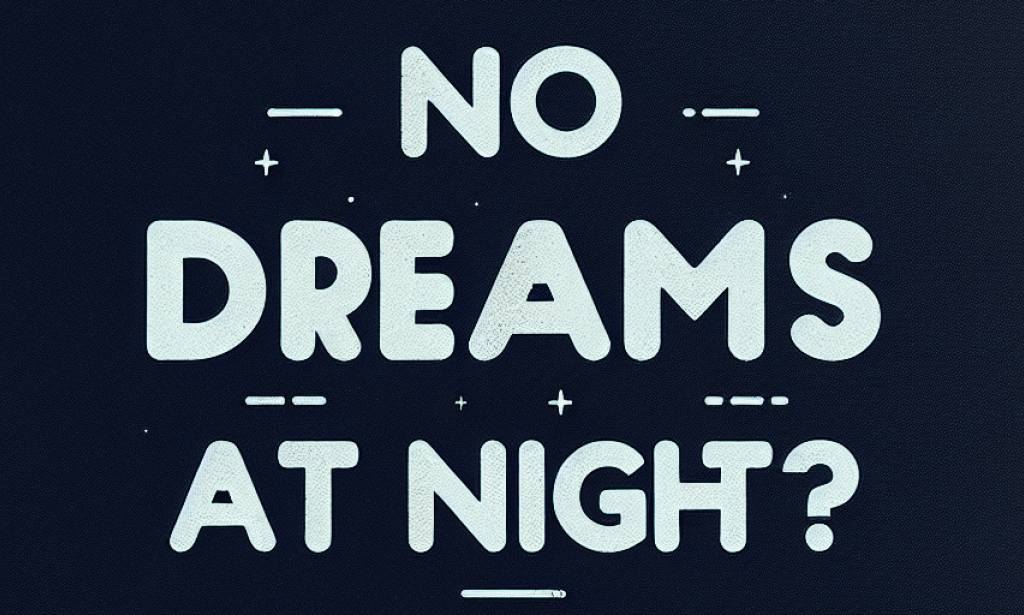The moment you wake up, there’s a brief dream that lingers at the edge of your mind only to vanish completely as soon as you pour coffee in the morning.It is a very common occurrence: one moment you are sailing through a vivid dreamscape and the next you are left with no more than an inexplicable feeling. For many people this everyday happening poses one strange question: what does it mean when I can’t recall my dreams?Understanding how dream memories work can provide interesting insights into our thinking processes, feelings, and general health.
The Science of Dreaming
Dreaming takes place during Rapid Eye Movement (REM) sleep which occurs several times throughout an average night. It is believed that individuals cannot act out their dreams because during REM sleep the brain activity increases resembling that of wakefulness while the body remains paralyzed.
Since way back neuroscientists have researched dreaming and dream recall mechanisms. The retention and creation of memories particularly for dreams is influenced by various factors such as neurotransmitter activities and interactions between different brain regions. Memories of dreams are made by key areas for memory processing like hippocampus or prefrontal cortex.
Factors Influencing Dream Recall
Sleep Quality and Cycles:
Sleep Stages: Dream recall happens more often when one is awakened directly from REM sleep. On the other hand, if the sleep stages are seamless without any break, then dreams may not be remembered.
Sleep Disorders: Sleep architecture can be disturbed by conditions like insomnia and sleep apnea causing broken REM sleep and thus poor dream recall.
Neurotransmitter Levels:
Acetylcholine and Norepinephrine: High levels of acetylcholine and low levels of norepinephrine during REM help in creating vivid dreams that do not necessarily lead to recall. Changing levels of these neurotransmitters might promote or hinder retrieval of memories upon waking up.
Stress and Emotional State:
Emotional Intensity: The amygdala region involved in processing emotions is responsible for remembering very emotional dreams.
Stress Levels: High stress reduces chances of awakening during REM sleep, hence affecting dream recall negatively.
Cognitive Engagement:
Pre-sleep Activities: Activities such as reading or problem solving done before going to bed may determine how much dream will be remembered.Sleeping on a full mind or being tired can either stimulate or slow down processes involved in thinking.
Psychological Perspectives on Dream Recall
Dreams and their recall have significant interpretative value from a psychological perspective. Diverse theories posit that dreams are a reflection of our subconscious ideas, unresolved problems, and emotions.
Freudian Theory:
According to Sigmund Freud, dreams can be seen as the expressions of repressed desires and unresolved conflicts. As per this theory, trouble remembering dreams may indicate resistance to addressing these hidden issues at a psychological level.
Jungian Theory:
To Carl Jung, dreams act as the line of communication between the conscious and unconscious mind. Dreams for him were instrumental in self-discovery and personal growth: which contribute towards poor dream recall suggesting detachment from inner self.
Continuity Hypothesis:
This modern psychological theory suggests that dreams do not differ from what we think about during wakefulness. Not being able to remember one’s dreams might suggest not being aware or attentive enough to life issues while awake.
Diverse Perspectives on Dream Recall
Cultural Views: Different cultures attach different importance to the meaning of dreaming. Some believe that dreaming is communication from spiritual realms while others see it as only physical manifestation in brain processes. These cultural perspectives can influence how much importance individuals place on remembering their dreams.
Neuroscience Today: The present-day neuroscience often looks at dreams as part of memory processing and consolidation in the brain. This aligns with the idea that it is not everyone who must remember their dream and that during sleep, the main role played by the brain is maintenance of cognitive health.
Methods That Can Be Used to Improve Dream Recall
Various techniques exist for people who wish to remember their dreams better in order to achieve more prominent dream recall:
Keep a Dream Journal:
Recording all your experiences upon waking up will increase remembrance over time. Even fragments can be jotted down to connect them into moderate full-fledged experiences.
Creating A Favorable Sleep Environment:
Sleeping area which is quiet, dark and comfortable environment may help both improve one’s sleep quality as well as enhancing optimal dream recall.
Setting An Intention:
Having some mental affirmations before you go to bed could be beneficial because it prepares your mind for dreaming again.
Mindfulness and Meditation:
In addition to increasing the overall cognitive functioning, practices that enhance mindfulness can lead to general attention enhancement that in its turn can be useful in remembering dreams.
Consistent Sleep Schedule:
Having a fixed sleep pattern also aids in stabilizing REM cycles so waking up during or shortly after dreaming process is more likely.
Conclusion
Inability to recall dreams is a common phenomenon caused by many factors, including psychological, biological and environmental factors.While this can be confusing, it is generally not a cause for alarm.Dreams have some functions that take place at an unconscious level and therefore do not require conscious memory to produce beneficial effects.However, dream enthusiasts who want to know what is going on behind their eyes while they sleep can use methods that improve their memory and allow them to see more clearly the mysteries within themselves through through dream experiences.
In short, whether remembered or forgotten, dreams are an indispensable part of human life, providing insight into our minds and having important adaptive functions.
References
- National Sleep Foundation. (2021). Sleep Stages. National Sleep Foundation
- Sleep. (2017). Fragmented Sleep and Dream Recall. Sleep Journal
- Lyon Neuroscience Research Center. (2014). The Role of the Temporoparietal Junction in Dream Recall. Lyon Neuroscience Research Center
- Journal of Clinical Psychology. (2018). Stress, Anxiety, and Dream Recall. Journal of Clinical Psychology
- Alcoholism: Clinical and Experimental Research. (2015). Alcohol Consumption and REM Sleep. Alcoholism: Clinical and Experimental Research
Sweet dreams!


You must be logged in to post a comment. Please Login or Register .